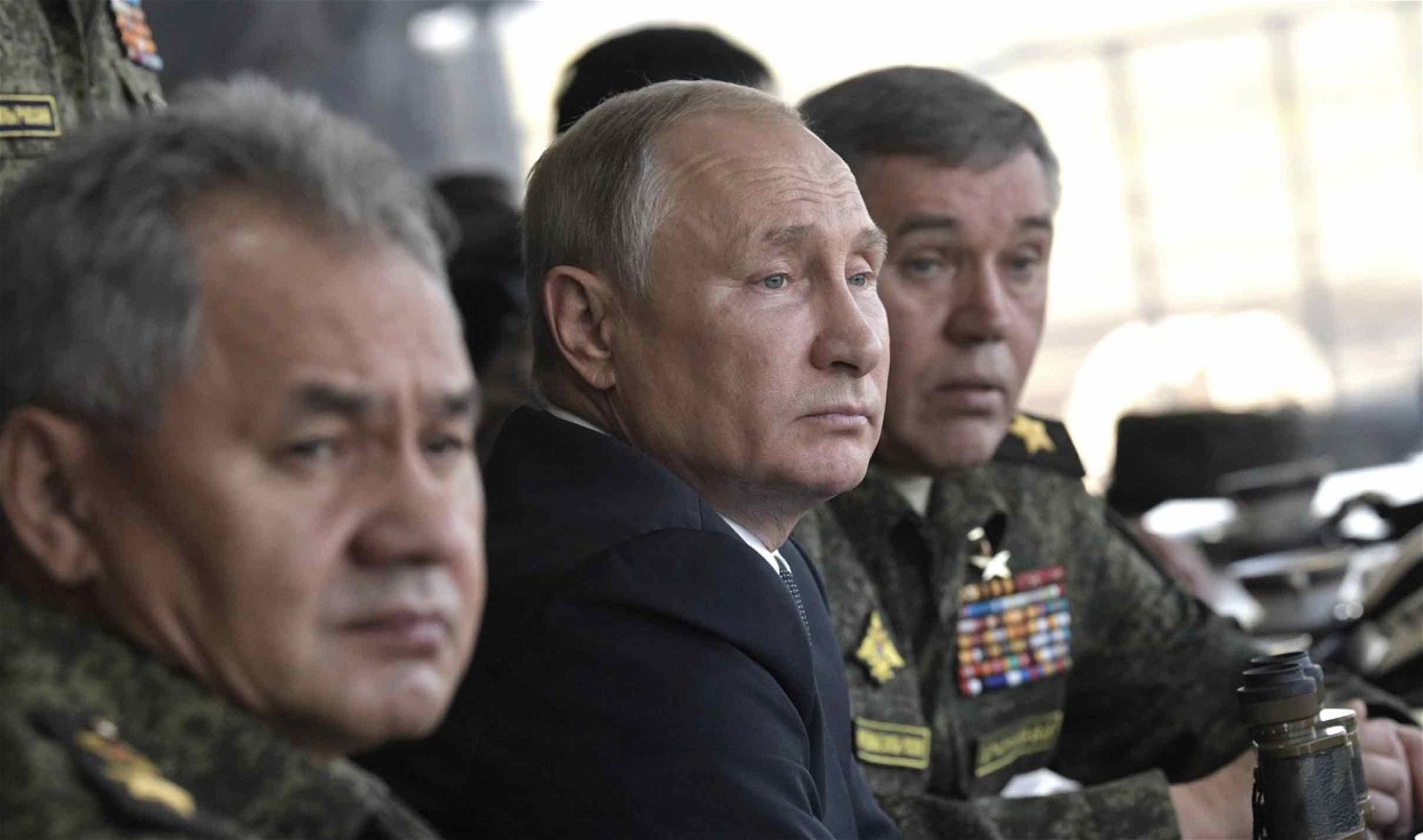

Welcome to this week’s Intelligence Brief… newly leaked information has revealed Moscow’s threshold for the use of tactical nuclear weapons in a series of formerly secret documents that have been revealed by the Financial Times. In our analysis of the situation, we’ll be looking at 1) what the documents say about Russia’s threshold for the use of tactical nukes, 2) how the new revelations compare to our existing knowledge of Russia’s military doctrine on nuclear weapons, and 3) what the potential outcome could be on international relations in light of the new information.
Quote of the Week
“Moscow will become even more reliant on nuclear, cyber, and space capabilities as it deals with the extensive damage to Russia’s ground forces.”
– 2023 Annual Threat Assessment of the U.S. Intelligence Community
Latest News: In recent coverage from The Debrief, we look at the massive Edwards Sanborn Solar and Energy Storage facility that went online this month following announcements that the project had reached substantial completion. Elsewhere, physicists say they are one step closer to the measurement of gravity at the quantum level. Links to all our recent stories cand be found at the end of this week’s newsletter.
Podcasts: In podcasts from The Debrief, over on The Debrief Weekly Report, Kenna and Stephanie unleash the bacterial beast as ancient and dormant bacteria are waking up. Meanwhile on The Micah Hanks Program, we dive into how disinformation relates to the U.S. government’s interest in UFOs. You can subscribe to all of The Debrief’s podcasts on our Podcasts Page.
Video News: Premiering this Friday on Rebelliously Curious, Chrissy Newton will be joined by Edward M. Lerner for a discussion about the science behind science fiction. You can check out this interview, and other great content from The Debrief, on our official YouTube Channel.
Now, it’s time to look at why newly leaked documents are raising concerns about Russia’s threshold for the use of tactical nuclear weapons in wartime situations.
Leaked Files Showcase Moscow’s Nuclear Strike Criteria
Between 2008 and 2014, Russia’s military was secretly devising war-gaming scenarios involving the country’s use of nuclear weapons in the event of a potential invasion by neighboring China, and a range of other situations where nuclear conflict could arise.
These were among the key discoveries in a series of leaked documents this week that convey not only secrets about Russia’s military strategies, but also the country’s surprisingly low threshold for the use of nuclear weapons in the event of a conflict with another nation.


The documents, first reported by the Financial Times, provide insights into Russia’s nuclear strategy and extend concerns about the country’s potential use of nuclear weapons beyond its ongoing war with Ukraine, and arrive just days after an acknowledgment by the Biden administration regarding national security concerns over Russian nuclear capabilities that could be used in space.
The revelations also add to existing concerns raised in a U.S. intelligence community assessment in 2023, which determined that losses the country has incurred during the Ukraine conflict have been significant enough that “Moscow will become even more reliant on nuclear, cyber and space capabilities” as it works to rebound from damages sustained by its ground forces.
Russia’s Threshold for Nuclear War Revealed
Based on information in the leaked documents, Russia’s threshold for the use of tactical nuclear weapons may be far lower than previously known or publicly acknowledged. Ranging from incursions by enemy nations to significant losses of its military assets, a variety of scenarios were outlined where Russia might resort to the use of nuclear alternatives when conventional methods could not be used to attain its objectives.
Notably, the documents also appear to expose the country’s concerns about its neighbors in China, even amidst alliances forged between Moscow and Beijing since the early 2000s.
Should a potential conflict arise with a foreign nation like China—or the United States—Russia appears to favor a doctrine of “escalation to de-escalate,” in which the deployment of a nuclear strike to attempt to circumvent a larger conflict might be utilized.
Although much of what the documents reveal relates primarily to strategic studies and wargaming scenarios, some of the sentiments conveyed about Russia’s suspicions do have real-world corollaries, which include the reinforcement of Moscow’s military capabilities near the Russian border with China, which to some extent have continued in recent years.
However, warming relations between the two countries in the years since the documents were produced have helped to facilitate the movement of Russian forces westward from the Chinese border in advance of its invasion of Ukraine.
Moscow’s Military Doctrine on Tactical Nuclear Weapons
Some of what is revealed in the documents align with previous assessments of Russia’s potential use of nuclear weapons under its military doctrine, which in 2000 stated the country may use such weapons to defend itself in response to a variety of attacks from other nations, which may include nuclear attacks against Russia, but was more broadly defined as any attack threatening “the very existence of the state.”


This remained unchanged in a subsequent version of Russia’s military doctrine produced in 2014. However, in 2020, the first declassified nuclear doctrine was made available by the Kremlin, which provided an expanded listing of four factors that could now result in a nuclear response from Russia. These include 1) data indicating a ballistic missile attack against Russia or its allies, 2) nuclear weapons or WMDs used against Russia or its ally nations, 3) attacks targeting Russian command, control, and communications components, and 4) the existing warning about any aggression toward Russia which it believes to be a threat to “the very existence of the state.”
New Revelations on Tactical Nuclear Weapons
Given Russia’s seemingly lower threshold for the use of tactical nuclear weapons conveyed in the leaked documents, one outcome of the new revelations involves their impact on Moscow’s relations with Beijing and Washington, introducing concerns that are likely to influence diplomatic engagements in the forthcoming years.
Last week, more than 500 new sanctions were placed against Russia “for its ongoing war of conquest on Ukraine and for the death of Aleksey Navalny,” President Biden said in a statement.
Overall, the exercises revealed in the leaked documents offer a window into Russian ideology regarding its nuclear arsenal, a cornerstone of the country’s national defense architecture, and one that governs to a significant degree how its forces are trained, and thereby dictates the country’s nuclear strike capabilities under potential battlefield conditions.
That concludes this week’s installment of The Intelligence Brief. You can read past editions of The Intelligence Brief at our website, or if you found this installment online, don’t forget to subscribe and get future email editions from us here. Also, if you have a tip or other information you’d like to send along directly to me, you can email me at micah [@] thedebrief [dot] org, or Tweet at me @MicahHanks.


Here are the top stories we’re covering right now…
- AI Superintelligence Alert: Expert Warns of Uncontrollable Risks, Calling It a Potential ‘An Existential Catastrophe’
AI safety expert highlights the uncontrollable risks of AI superintelligence, warning it poses an existential threat.
- Creation of Two Novel Isotopes Could Produce New Insights into Mysteries of Atomic Nuclei
A pair of new isotopes have reportedly been created, an achievement could yield promising new insights into the mysteries of atomic nuclei.
- 5,000-Year-Old Smashed Skull of Vittrup Man Tells Violent Story of an Ancient Ritual Sacrifice
A new study into the enigmatic Vittrup Man reveals new clues about his origins and the harsh way of life that led to his death millennia ago.
- This Massive Solar Farm, One of the Largest Projects in DoD History, Is Changing How We Look at Solar Energy
The massive Edwards Sanborn Solar and Energy Storage facility went online this month following announcements that the project had reached substantial completion.
- Earth Can Be Used as a Guinea Pig to Search for Extraterrestrial Life with This New Telescope, Astronomers Say
Researchers have just published a study that could advance our ability to detect extraterrestrial life, and Earth served as the guinea pig.
- Feeling Burnout at Your Job? Mindfulness in the Digital Workplace Could Help, Study Says
Improving mindfulness can potentially help mitigate stress and burnout, according to the findings of a new study that looked at how anxiety and overload can be prevented in the digital workspace.
- Breakthrough in Quantum Measurement of Gravity Achieved Using Levitating Magnets
Physicists are one step closer to the measurement of gravity at the quantum level, findings that may broaden our understanding of some of the most mysterious forces at work in our universe.
- This New Exosuit Will Use Artificial Intelligence To Decode Brain Signals For Movement
The Wyss Synapsuit Exosuit uses artificial intelligence to decode brain signals into actual movement for users.
- A Monstrous Reptile Rumored to be Largest of Its Kind on Earth Has Been Discovered in the Amazon Rainforest
A massive new species of anaconda that could potentially be the largest currently in existence has been uncovered in the Amazon rainforests of Ecuador, according to a newly published study.
- Dormant for Thousands of Years, These Organisms Are Suddenly Waking Up. Now Scientists Are Concerned.
Researchers have found that as global temperatures steadily rise, tiny organisms long dormant are now coming alive.
- The Moon Will Return to Earth to Die in 7.6-Billion Years. Here’s How It May Happen.
The Moon will eventually return to Earth, but humans won’t be around long enough to see it.
- Pyramid at Giza’s Controversial Restoration Has Been Halted by Egyptian Authorities
A contentious restoration of the Menkaure Pyramid at Giza has been canceled according to Egyptian authorities.
- Military Officials Tracking High-Altitude Balloon Spotted Over Western United States (Updated)
A high-altitude balloon is being tracked over the Western United States, according to officials who spoke on Friday with knowledge of the matter.
- New Phase of Matter Created During Experiments with Exotic Particles in Quantum Processor
A new phase of matter previously recognized only in theory has been created by researchers using a quantum processor.
- Universal Antivenom Able to Treat Nearly All Deadly Snakebites May Soon Be a Reality
Scientists at the Scripps Research Institute are closing in on a universal snake antivenom that could prevent over 100,000 deaths a year.
- 40,000 Years Ago, Neanderthals Developed This Sticky Technology to Help Them Craft Stronger Tools
Neanderthals in Europe were using a glue-like adhesive around 40,000 years ago, new research reveals.
- Ancient Discoveries in South American Cave Revealed to be Thousands of Years Older Than Experts Thought
Research into the emergence of rock art in Patagonia has revealed that imagery depicted at the Cueva Huenul 1 cave is thousands of years older than archaeologists previously estimated.
- Leaked Documents Reveal Beijing’s Big Business of Hacking
The existence of newly leaked documents revealing the Chinese government’s use of hackers for hire offer new insights into Beijing’s ongoing espionage efforts.
- UFOs and U.S. Presidents: Aerial Phenomena and the Oval Office
This week we take a historical deep dive into investigations of aerial phenomena and their relationship to the Oval Office.
- Intuitive Machines’ Odysseus Probe to Attempt Historic First Private Moon Landing Today: Here’s What to Know
Today’s Odysseus moon landing marks a historic partnership between NASA and private industry to revive lunar exploration.
- Inventors Create World’s First ‘Water Batteries’ That Won’t Catch Fire or Explode
An international team of researchers have invented to world’s first water batteries that could soon replace lithium-ion batteries.
- Unlocking the Power of Anthropomorphism: How Products with Human-Like Traits Could Shape Your Next Purchase
New research suggests anthropomorphism and products with human-like traits could revolutionize consumer behavior.
- Climate Change Is Impacting Solar Panels and Will Cause Them to Degrade Faster
A recent study says climate change may be accelerating the degradation of solar panels, causing them to break down faster.
